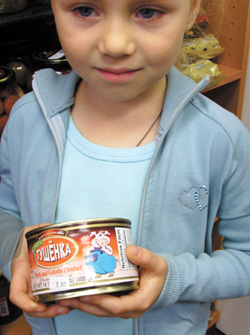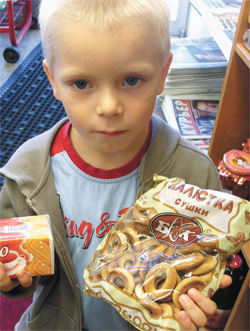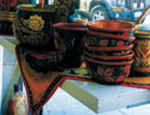 By Anna Gorelova
By Anna Gorelova
Bronx Journal Staff Writer
Originally published in Spring 2008
New York is a city of contrasts. You notice this the moment you leave JFK airport. All your ideas about the so-called Big Apple vanish instantly, and a completely different picture appears before you. You plunge into this unique atmosphere, found only in New York, where languages from all continents, from Asia to Africa, all come together. You go along the street and from everywhere you hear strange voices speaking such different languages! English, Spanish, Chinese, French, Russian…. You can’t count them all, for the population of New York is supremely multinational!
And what is quickly apparent is that all non-Americans generally communicate only with people of the same nationality, thus keeping to their native languages. In these national groups the way of life, the habits, the customs, and the meals – everything is just like it was in the home country.
It has become a historical fact that people of different nationalities usually live in “their” parts of the city. For example, Chinese in Chinatown; Russians in Brighton-Beach and in the Bronx. When you visit these places, you feel like being in a small country inside the city. And this is because the people who immigrated here remember and love their native land and try to keep everything just as if they were in their home country.
“I’m from Russia.” When someone tells you that, what is the first thought that comes to your mind? Probably cold winters with lots of a snow and brown bears. Very often these images are exactly what most people think when they hear the word “Russia.“ But these are all stereotypes that are stuck deep in our minds. Would you like to free yourself of them? Yes? Then you have a great opportunity, because New York has the biggest colony of Russian immigrants in the US.
The entire Russian-speaking population of the city can be divided into several categories. The first are the immigrants of the first waves of immigration (the end of the 70’s and the 80’s). The second are those who immigrated from the middle of the 90’s and those who have recently immigrated, and the third are Russian diplomats from the permanent mission of the Russian Federation at the United Nations.
From the very beginning, the first immigrants from the former Soviet Union have settled in Brooklyn in Brighton Beach. As a result, this area has turned into a Russian district with Russian restaurants, Russian shops, Russian cultural centers, and you can also buy Russian newspapers and magazines there. Many of the people living there have even nicknamed Brighton Beach “Russian America.” The Russians living there have not forgotten their native land and have created in Brighton Beach a picturesque atmosphere of Russia with all its features. For example, everyone celebrates Russian holidays, buys and cooks only Russian food, and speaks only Russian. There are also even people there who have lived all their life in New York and don’t know a word of English!
 Every year a variety of interesting events are held there which consists of Russian weeks and film festivals. At which time, anyone interested in Russian culture can learn something new about this country and its history. One can also try Russian cuisine with its delicious pies, like kulebyaka (which is a traditional Russian covered pie with meat or fish), pel’meni (a Russian version of Italian ravioli), pancakes and many other dishes. By the way, because of extraordinary popularity of this part of Brooklyn among Russian immigrants, the price of apartments there has now risen to Manhattan’s real estate equivalent.
Every year a variety of interesting events are held there which consists of Russian weeks and film festivals. At which time, anyone interested in Russian culture can learn something new about this country and its history. One can also try Russian cuisine with its delicious pies, like kulebyaka (which is a traditional Russian covered pie with meat or fish), pel’meni (a Russian version of Italian ravioli), pancakes and many other dishes. By the way, because of extraordinary popularity of this part of Brooklyn among Russian immigrants, the price of apartments there has now risen to Manhattan’s real estate equivalent.
During recent years the Russian population of New York has gradually begun to decrease: many people are moving to remote places of the country. For example, plenty of Russians today live in Kentucky.
The outflow of the Russian population from Brighton Beach began in the mid-90’s. People who lived in New York for some years and had come to know it better began moving to another part of the city – the Bronx. Why there? According to those who live there now, this area attracted them for its ecology, its remoteness from the noisy center, and the favorable living conditions. In the Bronx big families do not have to huddle in tiny apartments in multi-story apartment buildings: they can live in their own small houses.
Riverdale, a northwest part of the Bronx, became especially popular. It’s because of the residential complex of the Russian permanent mission to the United Nations (best known among local population as “The Big White House” or “Witch’s Hill”) which is situated there. If you’d like to speak to a Russian, then this is certainly the best place to do it. You won’t even have to go far because right in front of the residential complex there is a kindergarten which lots of Russian immigrants’ children attend. Natasha Kolesnikova’s son is one of them. According to her, Riverdale has probably the best living conditions in the whole city. What Natasha also highlights is that their life here is “much calmer than in Russia, because in the USA people tend to do everything in a less intense way.”
 Those who moved from Brighton Beach started to settle around the residential complexes and opened a Russian restaurant which now has become a shop called Vanechka’s. Among the Russian population this is a popular gathering place for meeting friends, and for daily conversation and gossip. Ninety percent of Vanechka’s customers are from the Russian population of Riverdale.
Those who moved from Brighton Beach started to settle around the residential complexes and opened a Russian restaurant which now has become a shop called Vanechka’s. Among the Russian population this is a popular gathering place for meeting friends, and for daily conversation and gossip. Ninety percent of Vanechka’s customers are from the Russian population of Riverdale.
You can see all the things that people in Russia buy on the shelves of the shop. Among these are various cereals (the one that people buy most of all is buckwheat, one of the favorite cereals in Russia), bread, and various canned products, and also a favorite Russian drink – kvass. It is also possible to buy Russian newspapers and books here.
When you enter the shop, immediately you feel as if you have entered Russia. Above a counter there are Russian matrioshkas (the Russian national big-bellied dolls painted by bright colors), on the walls – plates with patterns of khokhloma, a cuckoo clock is hanging in the corner – just like in old times in every Russian house. Everything here is arranged so that everyone who comes into the shop will feel the Russian atmosphere.
The shop prepares take-out food orders, but since the majority of its customers live in the neighborhood this is not so necessary. According to the shop’s owner, only people living very far from New York order food for the most part. These are Russians who immigrated to the USA many years ago and now feel nostalgic for Russia and just want to remember the taste of it.
Vanechka’s is not the only Russian shop in the Bronx. Another well-known shop, Zakuson, is located just a couple minutes walk from Kingsbridge. Among the regular customers of Zakuson are Regina Spektor, an American singer, and Michael Kuznetsov, a Russian actor who is often invited to star in the films of American directors. This shop is famous for its sausages and chocolate. Everyone who comes inside is greeted with a cheerful smile from the shop’s owner, along with detailed explanations about all its Russian products. If you wish to know more about Russian food don’t hesitate to ask, and the shop assistant will advise you and show you their tastiest products. And don’t forget to buy at least a small slice of sausage! Because if you don’t the owner of the shop, who prefers not to give his name, won’t stop asking you, “And what about this type of sausage? Are you sure you don’t want to try this one?” It’s just impossible to say no, and the majority of his customers agree to buy. But, believe me, you won’t be disappointed: Russian sausages are really worth trying!
 So, why did Russian citizens migrate to the USA and how do they feel in this new place? As one of the immigrants, Mikhail Desyatnikov, says, “Here their life is much better than the life which they have left in Russia. Those who couldn’t find a good job back in Russia got new opportunities here.” Besides, as the owner of Zakuson told me, in the USA all Russian immigrants in general have found good places to live and also a chance to start their own business. Another good thing about New York is its climate. The winter here is not so cold, so it’s really appealing to many Russian immigrants. For example, for Katya Demidova, 5, warm sunny days became a remedy for constant flu and strep throat that she used to have every year in Russia. The girl’s mother says that “winter in New York is like autumn in Moscow” and that it has been like a cure for her daughter.
So, why did Russian citizens migrate to the USA and how do they feel in this new place? As one of the immigrants, Mikhail Desyatnikov, says, “Here their life is much better than the life which they have left in Russia. Those who couldn’t find a good job back in Russia got new opportunities here.” Besides, as the owner of Zakuson told me, in the USA all Russian immigrants in general have found good places to live and also a chance to start their own business. Another good thing about New York is its climate. The winter here is not so cold, so it’s really appealing to many Russian immigrants. For example, for Katya Demidova, 5, warm sunny days became a remedy for constant flu and strep throat that she used to have every year in Russia. The girl’s mother says that “winter in New York is like autumn in Moscow” and that it has been like a cure for her daughter.
Do those who left Russia miss their country? Opinions in this question are divided. Some people say that they remember their native land, try to get all the latest news and keep in touch with their relatives and old friends from Russia. Some people even go to Russia to buy medicine! That is because it’s much cheaper than in the United States.
Others have already gotten used to living in America and don’t miss the life they left in Russia. However, according to one of the inhabitants of the Russian colony in Brighton Beach, Sergey Ryzhikov, who was a policeman back in Russia says, “immigrants from the first generation will never feel that they are fully Americans, for they will remain Russians. But their children, if they live all their life in the USA, may call themselves Americans without feeling divided between their past and present.” Still, none of the former Russians will ever entirely forget their roots, for they will keep following Russian traditions and eating Russian food.
If you are interested in Russian cuisine and would like to try Russian dishes, visit the two most famous Russian restaurants in New York, the Russian Tea Room (you certainly know this place, for it has been shown in many popular films). For example, Dustin Hoffman dressed as an insipid young woman in “Tootsie,” made his way through the red-green-gold glowing furniture of a hall of the Russian Tea Room for a meeting with his agent played by Sydney Pollack. Once even Madonna worked there! In addition, Michael Douglas, Woody Allen and Henry Kissinger visited this restaurant for meetings tête-à-tête, and in 1990 the British comedian Rowan Atkinson, known to everyone as Mr. Bean, celebrated his wedding there. The other restaurant, the Russian Samovar often holds Russian evenings which include Russian song and dance performances.
Page designed by Anna Gorelova



